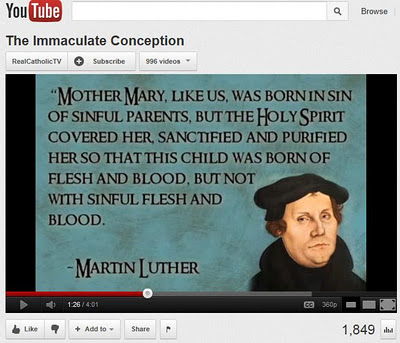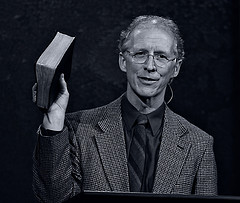When Roman Catholics find a Luther tidbit about Mary that seems to support Mariolatry, they run with it, even if the context contradicts the evidence they’re using. This quote is being entirely taken out of context. It has nothing to do with Mary’s immaculate conception. Rather than discussing Mary’s sinlessness, Luther’s later writings insist Christ’s sinlessness was due entirely to the miraculous work of the Holy Spirit during His conception.

James Swan writes:
The quote isn’t about Mary’s conception in her mother’s womb, it’s about Christ’s conception in Mary’s womb.
Here is the quote in context. In 1532 he preached:
Mary said, Behold the handmaid of the Lord; be it unto me according thy word.
14. That day, that moment when Mary assented to the angel Gabriel’s announcement, Christ was conceived. In that hour when she said, “Be it unto me according to thy word,” she conceived and became the mother of God; and Christ, therewith, became true God and true man in one person. Even though he is a tiny fetus, at that moment he is both God and man in Mary’s womb, an infant, and Mary is the mother of God.15. The Turks and the Jews make fun of this article of faith and feel that they have excellent reason to deride it. For that matter, we could banter about it as well as they. But as Christians, we must firmly hold onto this article of faith and never waver. From the beginning of time it has been prophesied that God’s Son would become man and that his mother would be a virgin. The first prophecy given Adam and Eve soon after the fall (Gen. 3:15) stated: “And I will put enmity between thee and the woman, and between thy seed and her seed; it shall bruise thy head, and thou shall bruise his heel.” God does not say the seed of the man, but rather the seed of the woman. Therefore, the mother of this serpent crusher must be a virgin. Later the patriarchs and the prophets also prophesied of this, until finally the beloved apostles proclaimed it to all the world. We have been baptized into this faith and are called Christians because we believe and confess it to be true. Let us, therefore, persevere unwaveringly in this faith. And if, as time goes on, sectarian spirits deny it, let us take a staunch stand in behalf of it.
16. This article is really the bottom line. Christ wanted his beginning to be like ours, but without sin, because he wanted to sanctify us wholly. We begin life in sin, we are conceived in sin, born in sin, no matter whether we be emperor, king, prince, rich, or poor; every human being is conceived in sin according to Psalm 51:5. Only Christ has the distinction and the honor to have been conceived by the Holy Ghost’s power. Since from our conception we are sinful, we are people whose flesh and blood and everything about us are soiled by sin, as indeed we see in ourselves; or when we look at those around us in the world, beset by evil desire, pride, multiple devils, and miserable unbelief. Thus we are conceived and born. For all of mankind is conceived and born in accord with creation’s decree, as recorded (Gen. 1:28): `Be fruitful, and multiply, and replenish the earth.” Christ could not be subject to such impure sinful conception and birth. He, indeed, was a genuinely true, natural human being, but not conceived or born in sin as all other descendants of Adam. That is why his mother had to be a virgin whom no man had touched, so that he would not be born under the curse, but rather conceived and born without sin, so that the devil had no right or power over him. Only the Holy Spirit was present to bring about the conception in her virgin body. Mother Mary, like us, was born in sin of sinful parents, but the Holy Spirit covered her, sanctified and purified her so that this child was born of flesh and blood, but not with sinful flesh and blood. The Holy Spirit permitted the Virgin Mary to remain a true, natural human being of flesh and blood, just as we. However, he warded off sin from her flesh and blood so that she became the mother of a pure child, not poisoned by sin as we are.
17. Thus what the angel spake came true: “He shall be great, and shall be called the Son of the Highest.” For in that moment when she conceived, she was a holy mother filled with the Holy Spirit and her fruit is a holy, pure fruit, at once true God and truly man, in one person. In time, then, this godly mother gave birth to God’s Son, a genuine man, but without any sin. Undoubtedly, his blood was red, his flesh, white; he suckled at his mother’s breasts, ate porridge, cried, and slumbered like any other child; but his flesh and blood were holy and pure. He is a holy person, the son of a pure virgin and God’s Son, true God and man in one person. [Sermons of Martin Luther Vol. 7 (Grand Rapids: Baker Books, 2000), pp. 291-293].
In 1534 Luther explained that Christ was “born of a young maiden, as you and I are born of our mothers. The only difference is that the Holy Spirit engineered this conception and birth, while in contrast we mortals are conceived and born in sin.”[Ibid., 294.]. As Jaroslov Pelikan has noted, Mary functioned in Luther’s theology as “the guarantee of the reality of the incarnation and of the human nature of Christ.”
On a related matter, James Swan once again writes:
A Roman Catholic blogger (Tiber Jumper) sent me over the following quote, attributed to Luther:
“When in his frailty, a man invokes the saints, he invokes Christ, and without fail he will reach Christ whenever he calls upon their names, for wherever they are, they are in Christ and Christ is in them, and their name in Christ’s name and Christ’s name in their name.”
Most of the relevant hits you’ll get on this one are back to the Tiber Jumper blog (and a few others citing it without a reference). The Tiber Jumper blog uses it for an “All Saints Day” post: “All Christendom since the first century after the disciples have taken advantage of the intercession afforded them through the martyrs and saints who have gone before them and the earliest recorded date of a worldwide remembrance of all saints day is recorded in 373 AD. Even Luther had this to say regarding the communion of saints”, and then follows the mystery Luther quote.
There are a handful of quotes from Luther affirming the invocation of the saints. Those quotes typically date pre-1521 or 1522. Typically, after that, Luther did not approve of or teach such a practice. For instance, in a sermon from August 15, 1516, Luther says, “O blessed mother! O most worthy virgin! Remember us, and grant that the Lord do such great things to us too.” In 1519, Luther still could exhort his congregation to “call upon the holy angels, particularly his own angel, the Mother of God, and all the apostles and saints” as a comfort in the hour when each was to face their own death. By 1522 things were changing. Erfurt Evangelists questioning Luther on the intercession of saints received this response,
I beseech in Christ that your preachers forbear entering upon questions concerning the saints in heaven and the deceased, and I ask you to turn the attention of people away from these matters in view of the fact…that they are neither profitable nor necessary for salvation. This is also reason why God decided not to let us know anything about His dealings with the deceased. Surely he is not committing a sin who does not call upon any saint but only clings firmly to the one mediator, Jesus Christ [Martin Luther, “Letter to Erfurt evangelists July 10, 1522,” What Luther Says, Vol. III, 1253].
It took me awhile to track this mystery quote down. It was this citation from What Luther Says that intrigued me about the quote and if whether or not it was from the same context. Plass also states, “A few paragraphs later Luther says: ‘Let them [the weak] call upon the names of the saints if they are bent on it, but under the condition (so fern) that they know how to guard themselves against lacing their trust and confidence in any saint. They must trust only in Christ’ ” (Ibid.). The thought about “the weak” was similar to the mystery Tiber Jumper quote.
Julius Köstlin presented a helpful overview on this topic. He states:
He had still, in the year 1519, spoken in unquestioning simplicity of the Invocation of the Saints, although he had already exposed the fallacy of the Catholic theory as to the meritoriousness of such prayers, and refused to give any countenance to the canonization of saints. As late as the year 15 21, when undertaking to expound the Magnificat, he, in the same spirit in which it was customary, in the sermons of the day, to interject the Ave Maria as an ejaculatory prayer, expresses the devout wish: “Would that the same tender Mother of God might secure for me the spirit to properly and thoroughly expound this her song,” etc. Yet, in this very work, he applauds especially the humility of the holy Virgin. She does not herself desire that we should honor her or expect to receive good from her. Only God should be praised in her. Although we are permitted to call her the Queen of Heaven, yet she is not a goddess, to bestow gifts or help. She gives nothing, but God alone gives. The Sermon in the Church Postils upon the Epistle for the Second Sunday in Advent shows us further the path by which he advanced to a total rejection of saint-worship. He here avails himself (though in the Latin postil he had not yet done so) of the words of the apostle glorifying the Father of our Lord Jesus Christ, to emphasize a warning against any worshiping of saints in which the worshiper does not press on into the presence of God Himself. He is filled with anxiety lest an abominable idolatry may by such means be introduced. He grants that some employ the worship of saints and of the Mother of God in a proper spirit. Nevertheless, it seems to him to be a dangerous custom, which should not be observed in the general congregation. Though there were nothing wrong in the practice otherwise, it seems to him at the outset, a suspicious circumstance that it has the support of no scriptural text or example, but that it rather contradicts those passages which teach us to place all our confidence in God. With reference to the miracles, which were commonly adduced in support of the custom, and which he had still acknowledged in his Unferricht auf etliche Artikel, etc.,’ he now declares, that we are to build, not upon these, but only upon the doctrine of Christ; and that the miracles in question may have been wrought upon the saint-worshipers by the devil himself.” Luther, therefore, accords at once in principle with the Wittenberg agitators, who wished to have saint-worship entirely abandoned. He fears it more than the worship of images, which was at most but a rare occurrence. He wishes here too, however, first to see only such an efficient use of the Word as may set free the consciences of men. It would have been his desire, indeed, that this question might be allowed to rest for a while, since its agitation was not a pressing necessity, and Satan was already trying by useless questions to draw the attention of men away from faith and love. If it be only once established that saint-worship is nothing, it will fall into disuse without any special additional effort upon our part, and Christ will then remain alone upon Tabor. This, says Luther, was his own experience ; he does not know how nor when he ceased to address prayers to the saints, contenting himself with the one Christ and God the Father.
He then comments on the 1522 letter to Erfurt:
In harmony with this is the advice given in 1522 to the Christians at Erfurt, among whom a dispute had been occasioned by “certain sermons upon unnecessary things, namely, upon the worship of saints.” He writes to them that, although it is not necessary to honor the saints (that is, by invoking them), he yet does not think that one who does so should be condemned, if he only do not place his confidence in them, since what such a one does to them is done to Christ, because Christ is in them and they in Christ. We should, therefore, bear with the weak. We must, at any rate, all at last forsake the saints and ourselves, to know nothing but of Christ, and let all else go.’ But when the evangelical teaching, which by its very nature could lend no sanction to saint-worship, had become thoroughly established in preaching and in the life of the people, and when, upon the other hand, such worship was cultivated but the more assiduously by the adversaries of the Gospel, Luther finally announced, as his position and advice, an entire and absolute rejection of the practice. It is true, he still, in a Sermon upon the Day of John the Baptist (June 24), which he also included unaltered in his Postils, granted that one might say to such a saint as Peter, ” Pray for me,” and only advised that it would be better to address one’s self to Christ alone, inasmuch as the Scriptures say nothing about such a prayer as the one mentioned, and we are only thereby led into a whole series of fruitless and improper questions concerning the condition of departed saints. But in the year 1523, he expresses his decided approbation of the Bohemian Brethren for their course in not calling upon saints at all, but resting content in Christ. It was probably in the same year that he advised Urban Rhegius at Augsburg to abandon the worship of saints, because it was an uncertain thing, and we should confine ourselves to that which is certain. He gives this advice when sending to his friend a sermon of Carlstadt upon the intercession of Mary (which appeared in 1523), in which the latter had declared the invocation of Mary to be not only unnecessary, but “not good.”‘ Moreover, he insisted that the invocation of the saints should no longer find a place in the regulations or hymns of the Church.’ The opinion that, according to I.k. xvi. 9, the saints may ” receive us into everlasting habitations” is combated expressly, in 1522, in a sermon preserved in the Church Postils, It is, he maintains, the poor living with us upon the earth who are there spoken of, who are standing witnesses of the faith which we have manifested in our treatment of them. We are to serve them, and in general all our fellowmen upon earth. The saints require no service upon our part, no foundations, etc.
Tiber Jumper’s mystery quote appears to be from Luther’s letter July 10, 1522 to Erfurt. I’m uncertain as to which secondary source he got it from. The quote appears to be found in WA 10 (2), 166. I find it surprising this short letter has (to my knowledge) never been translated into English. A helpful overview of the letter can be found here:
As to Karlsladt and Gabriel Didymus, who had occasioned the Wittenberg disturbances, it must be remarked that the latter had retraced his steps and become a different man, concerning Karlstadt, however, it was not known what he would do. He felt himself aggrieved that Luther had set aside his regulations, though the latter had not rejected his doctrines, having only declared his dissatisfaction that Karlstadt had busied himself wholly with ceremonies and outward things, and on account of these had neglected the true Christian doctrine concerning faith and love. Luther was now only concerned that they might imitate the Wittenberg tumult at Erfurt, in the removal of the images, the abolition of the mass, of one kind in the sacrament, and all the other matters. He accordingly repeatedly wrote to John Lange, and it being especially the invocation of the saints about which they were at variance at Erfurt, he drew up the writing: “Concerning the Saints. An epistle or instruction to the Church at Erfurt, assembled in God.” In it he exhorts the ministers to avoid the questions concerning the saints in heaven and concerning the dead, and to draw the people off from them, because there would be no end to questions here. That it was the object of Satan to detain them with that which is unnecessary, in order thus to hinder that which is necessary. That he did no sin who did not invoke the saints, but relied firmly upon the only Mediator, Jesus Christ, yea, that such a one was perfectly right and secure. That the others, however, should not be despised in their weakness. “Let them call upon the name of the saints if they will do so, only let them know and be on their guard that they do not put their confidence and trust in any saint but alone in Christ. For confidence is the highest honour which is due to God alone, who is the truth himself.” He in particular warns them against insurrection, saying: “There are many inconsiderate men who imagine themselves able to help the cause of the Gospel by means of the sword and the arm of flesh, thinking to have attained their object if they weaken or injure priests and monks. But they do not know that our warfare is not against flesh and blood, but against the wicked spirits of the air. (2 Cor. x. 3, 4.) Satan is a spirit, having neither flesh nor bone, wherefore iron and an arm of flesh will accomplish nothing. The hearts of men must first be torn from his grasp by means of the Word of truth; that is our sword and might which no one can resist: with it the friends of Christ divide Behemoth and cut him asunder. Behold wherewith I defeated the papacy and the spiritual power, which before was a terror to all the world, when all men acknowledged: Who can prevail against the beast? For it had power to make war even upon the saints, and to overcome them. (Rev. xiii. 4, 7.) Yet I never raised a finger against it, and Christ has destroyed it with the sword of his mouth.” (2 Thess. ii. 8.) Finally, he adds: “I fear, too, that much of all the evil is owing to ourselves, because we preach a great deal of our inability to do anything without the grace of God, and yet attempt to begin and to accomplish all manner of things of ourselves, without first, in humble prayer, beseeching God that he would begin and accomplish them through His Spirit. Thus it happens then, that we journey to Egypt, and begin the work in obedience to our own spirit, never first asking at His mouth concerning it. Therefore, my dear friends, let us act as we teach, committing all things to God, and without ceasing praying Him to direct us, to counsel and to help us, both in great and small matters, and not to permit us to follow our own opinion and reason in beginning anything.”
Conclusion
The quote in question comes from a transitional writing from Luther. Therefore, citing it as a support text for invoking the saints is unjustified.

 (1) Thanks for all the interest and prayers regarding my new book “Twelve What Abouts”. I have been getting some very encouraging feedback from those who have read the manuscript. I have also been grateful for the very helpful suggestions they have provided. It is due to be published in e-Book form the first week of January, 2012. I trust it will be a real blessing to people.
(1) Thanks for all the interest and prayers regarding my new book “Twelve What Abouts”. I have been getting some very encouraging feedback from those who have read the manuscript. I have also been grateful for the very helpful suggestions they have provided. It is due to be published in e-Book form the first week of January, 2012. I trust it will be a real blessing to people. Jaroslav Pelikan:
Jaroslav Pelikan: “The gospel continually reminds us, “It’s Christmas time!”” – John Fonville
“The gospel continually reminds us, “It’s Christmas time!”” – John Fonville Traditions can be very strong. This truth is perhaps never more reflected than in how this particular verse is usually interpreted.
Traditions can be very strong. This truth is perhaps never more reflected than in how this particular verse is usually interpreted. The question of evil is a big one and far bigger than most Christians realise. Dr. R. C. Sproul has outlined the issue very well.
The question of evil is a big one and far bigger than most Christians realise. Dr. R. C. Sproul has outlined the issue very well. One of the most important approaches to the problem of evil is that set forth originally by Augustine and then later by Aquinas, in which they argued that evil has no independent being. Evil cannot be defined as a thing or as a substance or as some kind of being. Rather, evil is always defined as an action, an action that fails to meet a standard of goodness. In this regard, evil has been defined in terms of its being either a negation (negatio) of the good, or a privation (privatio) of the good. In both cases, the very definition of evil depends upon a prior understanding of the good. In this regard, as Augustine argued, evil is parasitic — that is, it depends upon the good for its very definition. We think of sin as something that is unrighteous, involving disobedience, immorality, and the like. All of these definitions depend upon the positive substance of the good for their very definition. Augustine argues that though Christians face the difficulty of explaining the presence of evil in the universe, the pagan has a problem that is twice as difficult. Before one can even have a problem of evil, one must first have an antecedent existence of the good. Those who complain about the problem of evil now also have the problem of defining the existence of the good. Without God there is no ultimate standard for the good.
One of the most important approaches to the problem of evil is that set forth originally by Augustine and then later by Aquinas, in which they argued that evil has no independent being. Evil cannot be defined as a thing or as a substance or as some kind of being. Rather, evil is always defined as an action, an action that fails to meet a standard of goodness. In this regard, evil has been defined in terms of its being either a negation (negatio) of the good, or a privation (privatio) of the good. In both cases, the very definition of evil depends upon a prior understanding of the good. In this regard, as Augustine argued, evil is parasitic — that is, it depends upon the good for its very definition. We think of sin as something that is unrighteous, involving disobedience, immorality, and the like. All of these definitions depend upon the positive substance of the good for their very definition. Augustine argues that though Christians face the difficulty of explaining the presence of evil in the universe, the pagan has a problem that is twice as difficult. Before one can even have a problem of evil, one must first have an antecedent existence of the good. Those who complain about the problem of evil now also have the problem of defining the existence of the good. Without God there is no ultimate standard for the good. By John Piper: Website: www.desiringGod.org. Email: mail@desiringGod.org. Toll Free: 1.888.346.4700.
By John Piper: Website: www.desiringGod.org. Email: mail@desiringGod.org. Toll Free: 1.888.346.4700. I wrote the following transcript which is an excerpt from a sermon by Dr. Sinclair Ferguson on Romans 10:5-13:
I wrote the following transcript which is an excerpt from a sermon by Dr. Sinclair Ferguson on Romans 10:5-13: To John Townsend,
To John Townsend, By John Hendryx of monergism.com
By John Hendryx of monergism.com